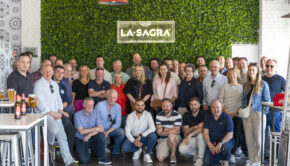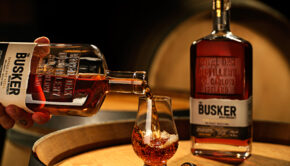Irish Wine Association Chairman Michael Foley — chasing the ‘draconian’

Michael Foley, Chairman of the Irish Wine Association, seems to have a battle on his hands to get the Government to look before they leap up the excise on wine. With the recent Budget, another round has just been lost but he’s not giving up yet. He tells Pat Nolan why.
18 December 2013

IWA Chairman Michael Foley – “We’ll continue to lobby aggressively for a reduction of the draconian increases and the unfair treatment of this category”
Comprising importers and distributors of wine, the Irish Wine Association sees its main mandate as being to ensure that wine, as an imported category, gets its fair share of voice on the Irish market.
“Our main priority would be to influence and lobby on behalf of the wine trade here at Government level,” explains the IWA’s Chairman Michael Foley as we sit in the boardroom at Findlater Wine & Spirits where he gets on with the day job as the company’s Marketing Director, “It’s to get access to the relevant industry information such as Government Clearances from bond and to share information and Best Practice across the wine industry.”
IWA Chairman since last May, he’s spent many years in the drinks business working for the likes of C&C, Edward Dillon & Co and Gilbeys (as Marketing Manager for the Smirnoff range).
He even helped develop a marketing strategy for Baileys in Latin America and spent time in Brazil as a result before leaving the business to spend a few years marketing Curves, a major player in the fitness franchising world, before returning to the drinks industry through Findlater’s last September.
Excise levy on wine
Undoubtedly the biggest challenge the Association has ever faced is that of the stratospheric levels of excise duty being levied on wine in Ireland today.
“The total increase over the last 10 months was a staggering 56%,” he points out, “We already had the highest level of excise duty in Europe and the recent increase has just magnified that effect.”
He’d particularly like to get across to Government the importance of the wine industry here.
“We want to get the message across that we’re an integral part of the hospitality industry and therefore integral to the 190,000 employed in the hospitality sector. We’re absolutely crucial for a restaurant’s profitability – up to 70% of which comes from wine.”
The IWA also plays a unique role in terms of the tourism offering in Ireland.
“It’s absolutely critical that the pricing of wine is at a level that doesn’t affect the value perception of ‘Ireland Inc’ because it has been proven that value is one of the prime factors in tourist decisions about choosing a country of destination,” he says.
“The Government needs to play a role in ensuring that brands of wine that are internationally comparable do not impact on us in terms of being perceived as poor value for a tourism destination.”
Now that wine enjoys a tax rate some 578% higher than the EU average, one wonders just how much progress the IWA has made with Government?
Not much, concedes Michael, but he adds, “We have achieved an extensive media campaign to highlight the injustice that wine has suffered over the last two budgets. However the issue we have is that Government seems to forget the importance of wine to the overall Exchequer take”.
Tax take – the figures
A short statistical lesson follows: in 2012 wine was responsible for €230 million in excise and €215 million in VAT (accounting for 27% of total excise generated in alcohol), he says.
To put these figures in context, wine excise now accounts for €3.18 per bottle (or €38.23 per nine-litre case); this means essentially that for a €9 bottle of wine €4.88 (or 54% of the purchase price) is attributable to excise and VAT.
“In terms of sparking wine and Champagne the figures are even more drastic. Years ago the Government decided to saddle sparkling wines and Champagne with double the excise rate of still wines, considering them to be the tipple of the aristocracy.
“So these now incur double the already draconian rate: €6.36 per bottle or €76.46 per nine-litre case, so obviously as trends change and consumers drink more Cavas and Proseccos they’re being ridiculously unfairly treated with this excise level.”
Result? Sparking wine sales are down 15.7%.
“And according to Government clearances to the end of August still wines are down by 6.5%,” he points out, “We forecast that this level of decrease will be sustained as long as draconian levels of excise remain in place.”
Return of the cross-border bonanza
Michael Foley is also keen to point out that the excise increases again raise the prospect of prolific cross-border shopping just as they did in 2008/9.
“When the excise reversal came in 2010 the trading pattern normalised again” he says, “increasing the total grocery basket value in RoI.”
This remains a risk as Government continues to increase the excise on wine here.
It’s not hard to see why.
“Remove production and supply chain costs of around 40% of the price of a bottle of wine, then remove around 54% for the Government and you’ve got around 6% left for the wine itself.”
While the Association has not yet achieved its goal, its campaign continues to lobby for an excise tax reversal using all the stakeholders, says Michael.
Alcohol abuse
The IWA’s other major remit is its input to the Substance Misuse strategy and the Alcohol Bill.
“We certainly played a role in delivering fact-based evidence to the Government that essentially took the emphasis off certain marketing freedoms for alcohol and raised the importance of education and engagement with all stakeholders,” he believes.
Despite there being a common misconception of wine abuse in Ireland, we’re 13th in terms of per capita consumption in Europe, accounting for just 17 Litres per person. To put this in context, the respective figures for Italy are 41L, Portugal 42L and France 45L.
“So we’d see wine as a unique category in terms of the importance of the message of responsible consumption of alcohol, principally due to the strength of its unique relationship with food.”
Wine in the pub
Wine sales through the pub sector remain a mere 4% of total wine sales here yet Michael sees the pub sector as a “massive opportunity”. This ties back in with the pub experience being an integral part of the tourist experience.
“As more pubs move towards a more comprehensive offering of food and drink, this is where wine can play a unique role,” he says.
Wine education
The Wine Development Board used run wine education courses which became economically unviable so education was taken off the central agenda “but not taken off the priority list,” he says.
“The delivery mechanism changed, so now there are a host of individual wine tutors delivering wine courses around Ireland under the framework of the WSET. The advantage of this is that this qualification is recognised in 58 countries so this skill is totally transferrable.
“From an IWA perspective there’s still the framework for educating people on the unique value of wine and one of our goals is to introduce a set of recognition awards for people who’ve achieved excellence in this field.”
There are other achievements Michael would like to see realised.
“At the moment we represent six of the major wine importers and distributors in the county” he says, “and my goal would be to be able to represent every supplier.”
And he’s clear where the Association must go, what it must do in 2014.
“We’ll continue to lobby aggressively for a reduction of the draconian increases and the unfair treatment of this category,” he tells me.
In truth, could the Government now be on the point of killing the goose that lays the golden excise egg?



 Print
Print






Fans 0
Followers